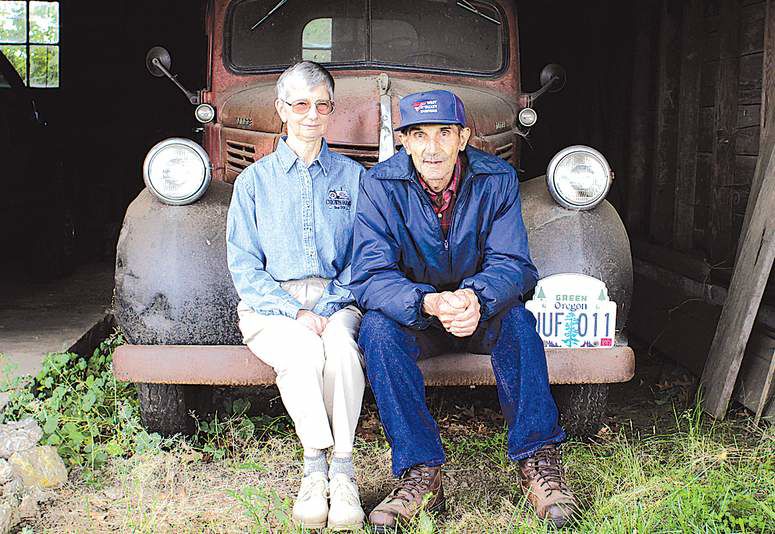Siblings ensure survival of family’s ‘Century’ farm
Published 5:00 am Sunday, July 24, 2011

- Brother and sister Charlie, 79, and Agnes Chegwyn, 69, sit on the bumper of Charlie's 1947 Dodge truck in McMinnville on July 12. The two siblings are the owners of Chegwyn Farms, a family farm that is 100 years old and one of 11 added to list of the state's “Century Farms.”
McMINNVILLE — It’s a stark line at the south edge of Charlie Chegwyn’s (“Sheh-GWINN’s) field. On his side, waist-high fescue sways in the breeze, its slender, yellow-brown stalks bent with heavy seed heads.
On the other side, houses. Multicolored, they sit shoulder to shoulder with blank windows staring out at 102 years of Oregon agricultural heritage.
Charlie, 79, and gaunt from a recent hospital stay for pneumonia, remembers when a prune-drying shed operated where that two-story brown house sits. As soon as McMinnville included his land within its urban growth boundary in 1981, he says, “Here come the developers.”
He returns a baleful stare as development toes the property line.
“And there it stops,” he says.
Permanently. Chegwyn Farms, where every shed, tree and tool has not just a purpose but a story, will remain a farm forever.
The urban fringe, where fast-growing cities bump against farms, is “always a problem,” says Tim Stieber, executive director of the Yamhill County Soil and Water Conservation District. It’s particularly so in this wine country, where new wealth, wild development claims and legal fights accompanied the race to catch overflow growth from Portland and Washington County.
Oregon law provides a strict land-use wall to shield farms from development, but the preservation of Chegwyn Farms is an unusual collaboration that accommodates both, Stieber says.
It began when Charlie Chegwyn and his 69-year-old sister, Agnes Betty Chegwyn, approached the conservation district for help in 2005. The subdivision next to the property was already a problem, saturating one of the lower fields with stormwater runoff.
“Generally, the landowners on the edge get worn down” and decide to sell, Stieber says. But Charlie had no interest in that.
“Forget the money, forget about that,” he says.
Neither Charlie nor Agnes had ever married and so had no heirs to take over the farm. But they knew what they wanted.
“We want to preserve the land,” says Agnes Betty. “People need to get out and move around, and get some fresh air.”
The siblings were born to a life of constant chores. They share the same house and remain wedded to the land, Stieber says.
“If you stay put in one spot long enough, it gets in your blood,” he says.
The best continued use of the farm is obvious to Charlie.
“Well, we gotta eat,” he reasons. “Why not raise food on the land?”
Assuring that required a series of swaps engineered by Stieber and the conservation district. Neighboring landowners, the city, an electric utility and the school district had a stake in what became of the farm.
Keeping the farm in agricultural use blocked a neighbor from developing, so in December 2007 the Chegwyns traded land to give that neighbor a corridor for a street and to extend utilities. Ten acres went to the McMinnville School District, which needed space for a future middle school and would have been stopped at the property line otherwise.
Charlie then deeded seven acres to the soil and water conservation district, which leased part of it to the city for a park — Chegwyn Farms Neighborhood Park, with bathrooms shaped like barns. It opened July 6 and immediately filled with kids. The conservation district may build a new office on part of the property.
In April 2008, Chegwyn Farms filed a conservation easement — like a deed restriction — that prohibits subdivision and development of the remaining 170 acres. Stieber says the easement is worth $6.5 million — the value that would have accrued if the property had been developed.
In March 2009, Charlie and Agnes Betty transferred ownership of the farm to the soil and water district. To honor them, the district applied for Oregon Century Farm certification, granted this summer. Chegwyn Farms now is officially among the 1,151 Oregon farms and ranches operated by the same family, on the same land, for 100 years or more.
“It’s an indication of our family’s perseverance,” Agnes Betty says.








